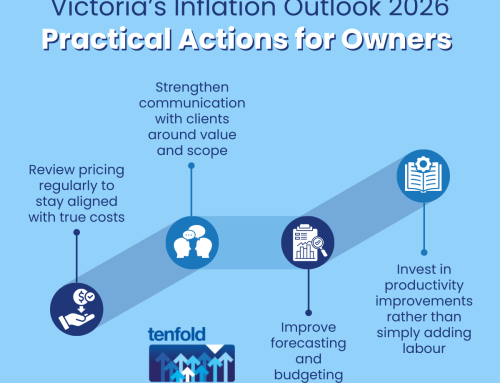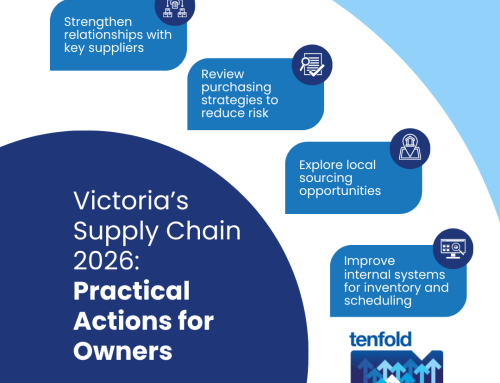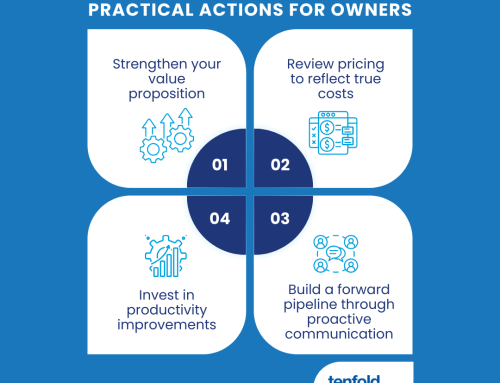How Trades Can Tap into the Growth Frontier in Mid-Size Commercial Construction
Tenfold Business Coaching’s recent builder-focused three-article series, beginning with “The New Growth Frontier in Mid-Size Commercial Construction,” mapped out the sectors driving Australia’s next wave of building activity. From medical centres to childcare hubs, aged care precincts to community facilities, the message was clear: mid-size commercial construction is booming.
This companion article speaks directly to the trades that make those projects possible. Electricians, plumbers, HVAC specialists, fire services, and mechanical contractors are all seeing rising demand for commercial-grade systems and professional delivery. With the right business coaching, trade businesses can step up and seize the opportunity.
Australia’s commercial construction sector is expanding faster than residential. According to ABS data, the value of non-residential building approvals rose by 26.1 percent in August 2025, while residential approvals declined. This shift is being driven by population growth, government investment, and the need for more sophisticated infrastructure in growing suburbs and regional centres. Projects like health clinics, childcare centres, and council recreation facilities require advanced trade systems – multi-zone HVAC, fire protection, 3-phase power, centralised hot water, and integrated communications. Builders need reliable trade partners with commercial experience, and that’s where the biggest opportunity lies for capable operators.
The Demand Surge for Commercial Trades
Non-residential building activity is not only experiencing significant growth but is also becoming increasingly diverse. Across various regions of Australia, mid-sized commercial projects are emerging in multiple sectors, each with its own unique technical requirements and specifications.
For example, medical centres now require advanced HVAC systems that feature Building Management System (BMS) integration and compliance with medical gas standards. Childcare centres, on the other hand, need plumbing systems that are both safe and highly efficient, as well as fire protection measures that meet strict safety standards. Community hubs are demanding scalable electrical systems and comprehensive data cabling solutions to support modernised facilities.
However, a shortage of suitably qualified tradespeople within many commercial disciplines has become a significant challenge. As a result, builders are actively seeking new local and national partners to meet increasing demand. Regional health clinic expansions and council-led recreational upgrades are particularly driving the need for specialised electrical and HVAC contractors. For trade businesses ready to adapt and evolve, these developments offer a strategic opportunity to expand operations and strengthen market position across Australia.
How Commercial Work Differs from Residential
Commercial projects introduce a significantly higher level of complexity compared to residential work. The scope of these projects tends to be much larger, involving more extensive, highly integrated systems. For example, HVAC (Heating, Ventilation, and Air Conditioning) installations often span multiple zones within a building and are equipped with advanced automated controls to optimise performance and energy efficiency. Electrical work on commercial sites often involves three-phase power supplies and backup systems to ensure reliability during outages. Plumbing services must comply with stricter Australian standards for flow rates, temperature regulation, and accessibility features to meet building codes and safety requirements.
Documentation requirements during such projects are far more extensive, including detailed quality assurance (QA) manuals, occupational health and safety (OH&S) protocols, commissioning reports, and comprehensive warranty records. This extensive documentation helps ensure compliance with standards and provides a record for future maintenance or dispute resolution. The process of coordinating all these elements becomes increasingly complex, often involving multiple stakeholders, including architects, engineers, subcontractors, and client representatives. It also requires managing sequenced trades and interdependent scopes of work to ensure smooth progress and prevent delays.
Financial management also shifts in commercial projects. The cash flow model becomes more sophisticated, with progress claims, retentions, and contractual clauses playing a key role in payments. This system replaces the simpler invoicing process typically seen in residential construction, demanding more detailed record-keeping and financial planning.
While the liabilities and risks associated with commercial projects are undeniably greater, so too are the potential rewards. Successful execution can lead to significant profit margins, especially for trade businesses that operate professionally and consistently deliver quality work. Investing in advanced business coaching and adopting a disciplined approach to project management and safety standards can substantially increase the chances of success in this demanding but lucrative segment of the industry.
Preparing Your Trade Business for Commercial Projects
Success in commercial work begins with thorough preparation and being well-equipped. Trade businesses must focus on upskilling their teams through ongoing technical training, upgrading systems and equipment to meet industry standards, and actively building and maintaining credibility within their fields. It is essential to have comprehensive technical knowledge of Building Management Systems (BMS), energy-efficient heating, ventilation, and air conditioning (HVAC) systems, fire safety systems, and medical gases, as these are often critical to project requirements and client trust.
Furthermore, all compliance documentation must be detailed, accurate, and easily accessible. This includes Safe Work Method Statements (SWMS), quality assurance procedures, and detailed commissioning templates. Developing and maintaining a robust portfolio of completed projects can significantly enhance credibility and help establish trust with potential clients.
Starting small with commercial jobs such as office fitouts, retail refurbishments, or undertaking subcontractor roles is a prudent strategy, allowing businesses to demonstrate their capabilities while managing risk. Building strong relationships is also crucial; engaging with commercial builders, project managers, and consulting engineers can open new opportunities and foster long-term partnerships.
It is equally important to review and expand insurance coverage regularly, including contracts for work completed, professional indemnity insurance (especially if your work involves design elements), and performance bonds that guarantee project completion.
To further support growth and success, trade owners should consider engaging business coaching services. These services help treat readiness as a strategic project, with clearly defined milestones, goals, and ongoing support to ensure the business is prepared for the demands of the commercial construction sector.
How to Win and Deliver Successfully
Winning commercial work involves more than just competing on price. Builders and developers are actively seeking trade partners who can provide niche expertise, professional and comprehensive documentation, and proactive, transparent communication.
Whether it’s delivering specialised healthcare HVAC systems, fire safety upgrades, or data cabling for educational institutions, trade businesses should clearly identify their key strengths and position themselves accordingly within the market. Tender packages need to be detailed and complete, including a well-defined scope, clear inclusions and exclusions, precise shop drawings, and thorough commissioning plans.
Open and honest communication is essential as early problem-solving not only builds trust but also increases the likelihood of repeat work and ongoing collaborations. Offering post-handover service contracts can further secure recurring revenue streams and help deepen client relationships over time.
With guidance from a knowledgeable business coach, trade businesses can refine their market positioning, enhance their service delivery, and build a strong reputation that consistently attracts lucrative commercial clients.
Managing Risk and Profitability
Commercial projects require disciplined project control to ensure successful delivery. Cashflow management must be meticulous, with longer payment terms and retentions carefully factored into accurate forecasting. Margins should include risk allowances and variation contingencies to account for potential uncertainties. Labour capacity needs to be forecasted precisely to prevent overcommitting resources and avoid project delays.
Compliance is non-negotiable, with standards such as AS1668 for ventilation and NCC requirements shaping both design and delivery processes. Quality control must be thoroughly documented digitally, with evidence readily available for handover and warranty claims.
Additionally, next level business coaching plays a vital role in helping trade owners develop robust systems for cost tracking, risk management, and maintaining profitability, ensuring that business growth does not compromise financial stability or operational efficiency.
The Strategic Advantage of Business Coaching
Moving from residential to commercial work is not just a technical shift; it’s a strategic evolution. Trade businesses must rethink their pricing models, delivery systems, and client relationships.
Business coaching provides the structure and insight needed to make that leap successfully. Tenfold Business Coaching has helped dozens of trade businesses grow into commercial markets, guiding them through readiness assessments, tender preparation, and strategic partnerships. If you’re ready to take your trade business into commercial construction, book a strategic coaching session with Tenfold to map your path.
FAQs – Business Coaching Insights for Trade Businesses
Can a trade business with mostly residential clients move into commercial projects?
Absolutely. Many successful commercial contractors started with residential roots. By taking on smaller commercial jobs like office fitouts or retail refurbishments, trade businesses can build experience, credibility, and the systems needed to scale up.
Which trades are most in demand for commercial work?
Electricians, plumbers, HVAC and mechanical contractors, fire protection specialists, and communications technicians are all in high demand. As mid-size commercial projects become more technically complex, builders are actively seeking trade partners with the right expertise.
What are the biggest differences between residential and commercial contracting?
Commercial work involves more complex systems, stricter compliance requirements, and greater coordination across multiple trades and stakeholders. Documentation, commissioning, and cashflow models also differ significantly from residential projects.
What do builders look for in a commercial trade partner?
Builders want trade partners who are professional, reliable, and compliant. That means clear documentation, consistent delivery, and strong communication throughout the project. Price matters, but trust and performance win repeat work.
How can business coaching help trade companies grow in this space?
A business coach can help trade owners structure their pricing, forecast capacity, prepare for tenders, and build strategic partnerships. With the right business coaching services, trade businesses can reduce risk, accelerate growth, and position themselves as trusted commercial operators.






